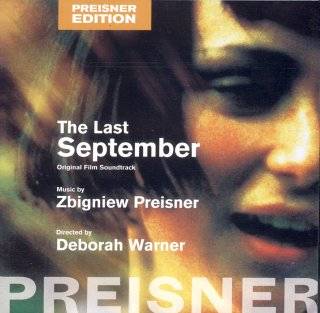The Last September is adapted from the novel by Elizabeth Bowen,
setting a coming of age drama against the end of British rule in Ireland.
The cast - Maggie Smith, Michael Gambon, Jane Birkin, Keeley Hawes - oozes
class, and there are many names from the quality end of British cinema behind
the camera, while into this quintessentially Anglo-Irish production steps
Polish composer Zbigniew Preisner, providing just as appropriate a score
as he did for The Secret Garden and FairyTale: A True Story.
The Last September is not as much a departure for Preisner as the
simultaneously released entry in Silva Screen's Preisner Edition as
Aberdeen, finding him blending his very familiar otherworldly minimalism
with a certain Englishness of character to captivating effect. This score
is entirely acoustic, utilising a variety of soloists against a small string
orchestra. The guitarist, John Parricelli, is the same here as on
Aberdeen, but one surprise is to find that Preisner's regular pianist,
Leszek Mozdzer (see my review of Preisner's
10
Easy Pieces for Piano ) has been replaced by Simon Chamberlain;
who to his credit, ably captures the familiar ghostly/romantic sound of the
composer.
Cues vary between Preisner's familiar understated atmospheric writing and
evocations of classically English 20th century pastoral film scoring; one
example being the rippling piano against strings of 'The Tennis Party' leading
into the spectral, dislocated sound-world of 'The Telescope'. Beyond this,
lending a particular character is the solo writing for glass harmonica, played
with considerable skill by Alasdair Malloy. It is remarkable the sheer range
of tones, from voices akin to a pan-pipe, to the simply indescribable, which
this musician is able to elicit; the use of harmonics in, for example, the
opening of 'The Ambushed Soldier', working to very telling effect.
Many of the tracks are short, 7 of the 12 coming in at under 2 minutes. There
is however an extended opening suite, an overture by another name which will
surely reappear on many a Silva Screen compilation album. There are two different
end titles, though we are not told which one is used in the released film.
Both are attractive, the second version having the more satisfactory resolution,
the two being quite different pieces, the former focused on the piano, the
latter on a duet for trumpet and piano, dissolving into the most delicate
of chimes. The effect is one of chilling finality.
The Last September a gorgeously recorded disc, with some details
of the production such as the alternating of individual slow harp notes from
left to right effectively establishing the sense of a pristine musical world
more perfect than everyday reality, a musical refinement elevated in the
same way Preisner's score for La Double Vie de Véronique.
I would recommend both this an Preisner's Aberdeen highly. If you
like the composer suggesting one over the other is nearly impossible, though
personally I slightly prefer Aberdeen. Perhaps the solution is to
put both of these and Deckalog, the other new entry in Silva Screen's Preisner
Edition, on your record token list.
Gary S. Dalkin





